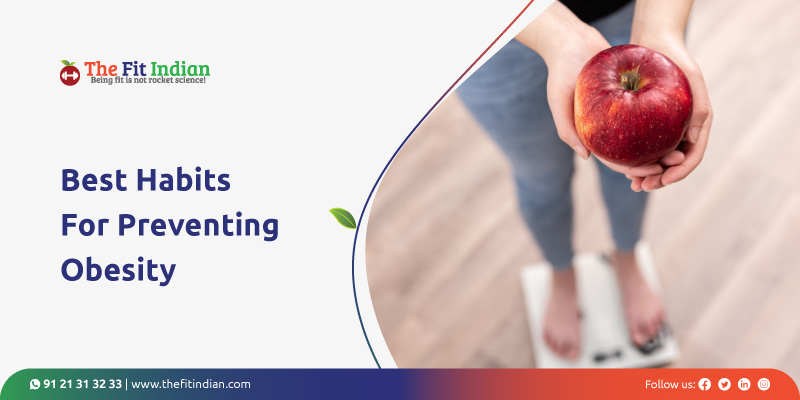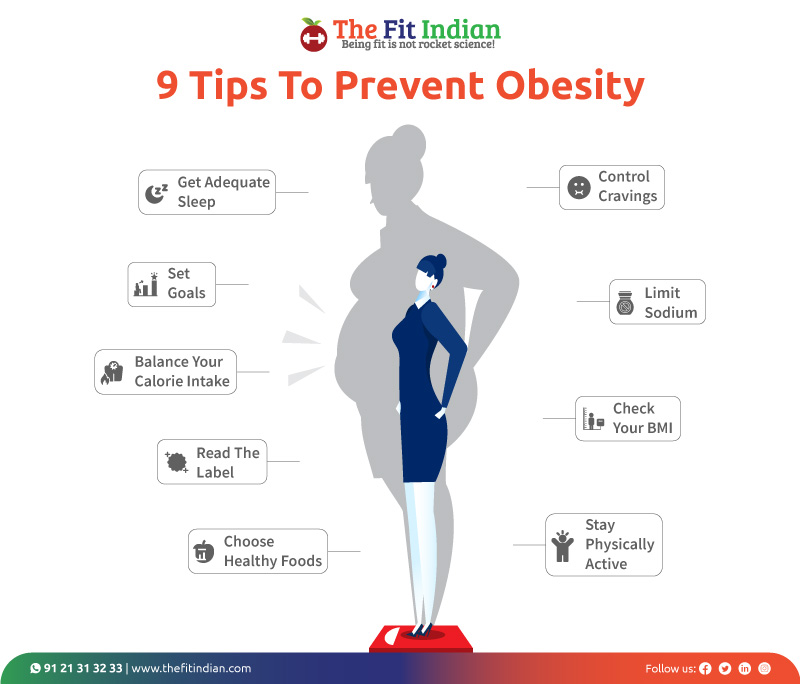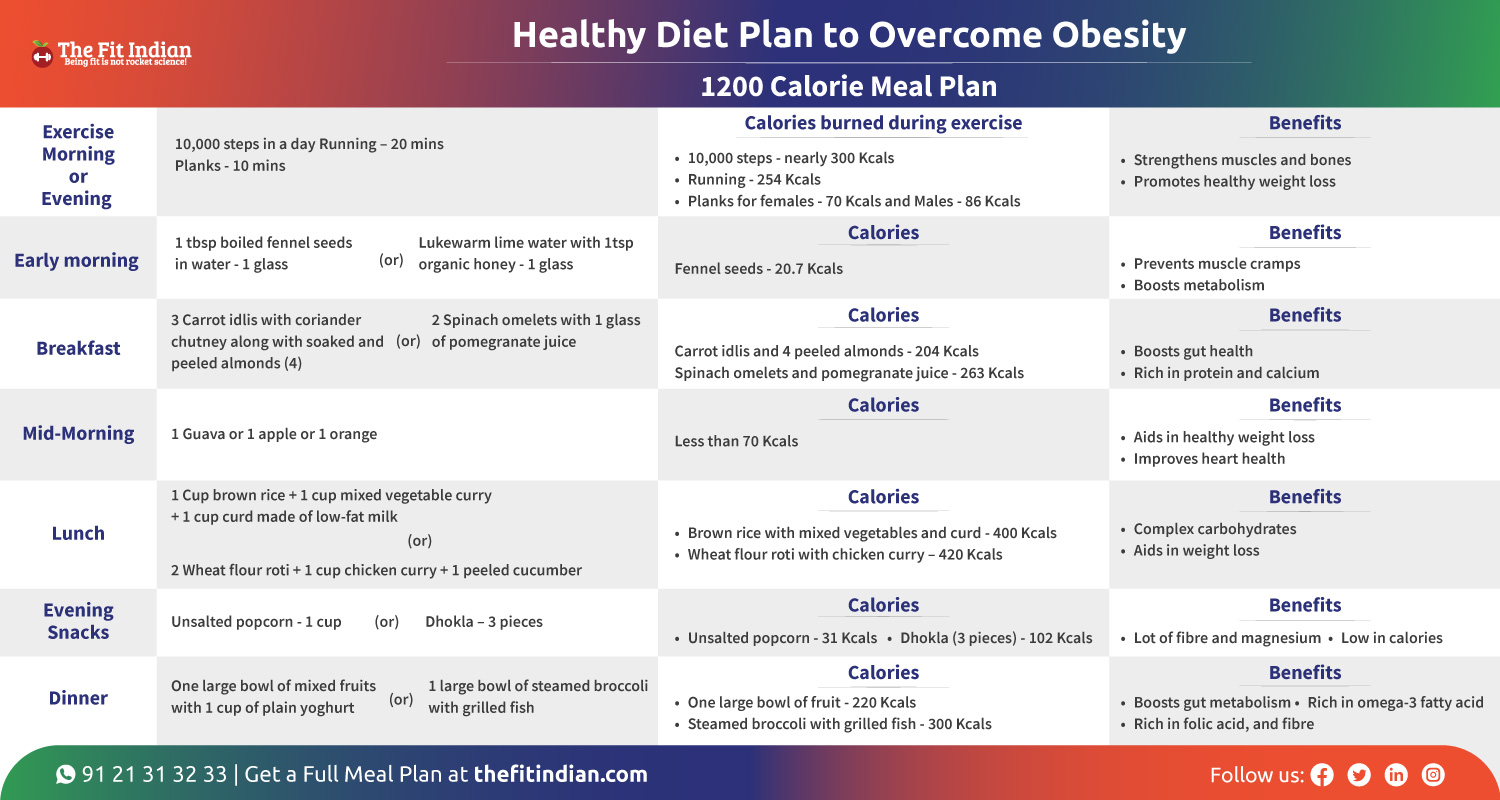1200 Calorie Indian Diet Plan to Control Obesity and 9 Best Habits for Prevention
Reviewed by: Dr. T S Deepthi Sarojini | Author: Manoja Kalakanti
Obesity is a common health condition in which an individual has a high amount of body fat. A body mass index (BMI) of 30 or more signals obesity. It has become widespread and is a significant concern for governments across the globe. The lifestyle changes seen in the latter half of the 20th century drove the rise in obesity. Healthy food habits have been replaced with unhealthy junk foods and a diet rich in fats, sodium, and sugar. Lack of physical activity and a sedentary lifestyle have further worsened the situation. Prevention of obesity requires changing lifestyle habits and keeping track of your weight. Good eating habits and regular exercise can make a huge difference.

Even the slightest loss of weight can improve your quality of life and prevent obesity-related diseases. Here are some of the best habits to prevent obesity.
9 Best Habits For Prevention of Obesity
Your eating habits play the most critical role in the management of obesity. If you already are suffering from obesity, you can prepare a diet for overweight people with the help of experts. Exercising and regularly checking your weight can also help you track your weight. You can also consult a nutritionist or a dietician to get a customized diet plan for the prevention of obesity.

Medicines, surgery, and intervention from doctors can help you overcome the condition, but it is best to stick to natural methods to prevent obesity. Why go through complex procedures when you have effective weight loss techniques at home?
1. Get Adequate Sleep
Sleep is essential for optimal health. A lack of sleep can result in a wide array of health problems. Inadequate sleep has been linked to obesity. Sleep deprivation can result in hormonal imbalances; this can cause you to overeat. People who get less than the required amount of sleep tend to eat unhealthy, high-calorie foods. They would also be too tired to exercise, which prevents you from burning calories. Lack of proper sleep is also known to affect your metabolism.
2. Set Goals
No plan can be executed properly without goals. If you know your goals and aim for them, you can keep track of your weight. Unrealistic goals must be avoided. Losing a lot of weight in a short span may be unrealistic in most cases and also unhealthy. Set a target for weight loss and calorie intake, and calories burnt. Follow a diet plan and exercise regimen and regularly check your weight to keep track of the changes. It would also provide useful insight into what works and what doesn’t.
3. Balance your Calorie Intake
This is a very critical step in your weight loss and management journey. The more calories you consume, the more weight you gain. You can burn the excess calories and keep your weight at a healthy range through exercise. But it is best to avoid excess calorie intake.
4. Read the Label
One of the biggest reasons for the rise in obesity in modern times is the high consumption of packaged foods. Most of these foods, even the so-called healthy ones, include harmful ingredients. They are often high in sugar, fats, sodium, and other unhealthy ingredients. Always check the label before buying any product; look out for trans fats and other harmful ingredients.
5. Choose Healthy Foods
The role of nutrition for weight loss cannot be stressed enough. Choosing the right food and avoiding the unhealthy ones can make all the difference. Avoid packaged and processed foods, foods high in salt, sugar and fats, and refined foods. Instead, go for healthy fats such as – avocados, nuts, seeds and fatty fish, whole grains such as – brown rice, oats, and whole wheat. Eat a lot of vegetables, fruits and increase the overall consumption of fibre.
6. Control Cravings
Controlling your cravings is essential when you are on a weight loss journey. Hunger cravings can cause you to eat unhealthy foods, usually junk foods. It can also cause you to binge on foods late at night. Eat a healthy and big breakfast that would keep you satiated throughout the day. Avoid refined foods, simple carbs and sugary foods that are digested quickly. Eat complex carbs, whole foods and fibre-rich foods that keep you full for a long time.
7. Limit Sodium Intake
Sodium harms your health and can increase the risk of conditions such as heart attacks and high blood pressure. Recent studies even show a direct link between obesity and high salt intake. It is also difficult to avoid excess intake if you consume packaged foods. They usually come with a high amount of salt content.
8. Check Your BMI
The Body Mass Index (BMI) is the best way to ascertain if you are obese or not. A BMI of 30 or more is an indicator of obesity. BMI takes into consideration your height, weight, age and sex to determine the score. Regularly checking your BMI would let you know if the obesity management plan is working or if you need to make changes.
9. Stay Physically Active
Staying physically active is a vital part of obesity management. If you are unable to burn calories, you will gain weight. The more you eat, the more calories you consume and the more weight you will gain. The only way to burn off excess calories to maintain a healthy weight is exercise. Physical activity decreases overall fat and fat around the waist. Even 30 to 40 minutes of exercise per day is good for your health. You can walk, jog, run, hike, lift weights or swim to burn those calories and stay healthy. Exercise will also keep obesity-related complications at bay.
Proper eating habits, as shown above, coupled with exercise, can help in the prevention of obesity and also the management if you are already afflicted with it. But why is prevention so crucial? Keep reading to find out.
Why is Prevention Important?
It may be challenging to ascertain the true extent of damage obesity causes to one’s body. Many minor issues such as tiredness or fatigue, bad mood, and breathing problems that you may brush off as normal may be linked to obesity.

Not managing obesity could cause immense damage to your health and result in severe health complications over time such as:
- Heart disease
- Stroke
- Type 2 diabetes
- High blood pressure
- Osteoarthritis
- High cholesterol
- Mental health issues
- Sexual health problems
So, prevent obesity before it causes any severe harm to your health. You can follow the obesity diet plan as shown below to maintain a healthy weight and for the prevention of obesity.
Diet Plan for Prevention of Obesity
Your eating habits and weight control are directly related. Diet is considered to be the primary cause of obesity, and it is also the most vital part of obesity management.
Below is a healthy diet plan for the prevention of obesity and for optimal health.

Click Here For Full Screen Image
These are some excellent examples of healthy eating habits. Follow a healthy diet as such consistently and track its impact on your weight and overall health.
For a customized diet plan, you can consult a nutritionist or a dietician. You can also get the help of a fitness expert to assist you with your workout.
Takeaway
Maintaining a healthy weight is crucial for your overall health. A healthy weight will ensure that you stay fit, have a good quality of life, and avoid any obesity-related complications. Keeping your weight under control and tracking it is no rocket science. With a few tweaks in your lifestyle, you can successfully manage your weight. Follow a diet rich in whole foods such as vegetables, fruits, healthy fats, nuts, legumes, and seeds, and engage in regular physical activity to stay fit. Even 30 minutes of daily exercise is enough to keep your weight within the healthy range. So, eat healthy foods, move a little and avoid unhealthy foods to maintain a healthy weight and stay fit.
FAQ’s
1. What are some of the health effects of obesity?
Obesity can result in several health complications. It can cause heart diseases, stroke, high blood pressure, type 2 diabetes and other health problems.
2. What happens to your body when you become obese?
Obesity can cause a lot of changes in your body. Over time, it can cause damage to your blood vessels and organs, which could cause severe health issues.
3. What can I do to help prevent obesity?
You can change your lifestyle. Avoid unhealthy foods such as bad fat, fried foods, junk foods, highly processes foods, sugary treats. Consume more natural fats, whole foods such vegetables and fruits. Follow an exercise regimen and stay consistent.
4. What foods to eat to help with obesity?
Whole foods such as whole grains, fruits, vegetables, nuts, legumes and seeds are foods that can help with obesity. You can also consult a nutritionist for advice on a proper diet plan.
5. What’s the best way to keep your body healthy?
Following a healthy lifestyle is the best way to keep your body healthy. Moderation is the key, whether in diet, exercise or rest. Avoid smoking and drinking too much alcohol, maintain a healthy diet, exercise regularly, avoid excess salt, sugar and unhealthy fats and get regular health check-ups.
6. How to have healthy eating habits?
Avoid unhealthy fats, excess salt and sugar, deep fried foods, processed food and limit packaged food consumption. Eat healthy fats, vegetables, fruits and whole grains.
7. How to develop healthy eating habits?
Eat slowly, try mindful eating, have a balanced meal, eat smaller meals, keep an eye on portions, count your calorie intake and don’t skip your breakfast.
8. How can obesity be prevented?
Obesity can be avoided by following a healthy lifestyle. Exercise regularly, eat healthy foods, avoid unhealthy foods such as processed foods and foods rich in fats, salt and sugar. You must also manage stress, drink lots of water and get adequate sleep.
9. How to overcome obesity?
Overcoming obesity can take a lot of planning and effort. You need to modify your lifestyle by eating a healthy diet, exercising regularly. You can also get help from a dietician or a nutritionist.
10. How to control obesity in a healthy way?
Natural way is the best way for the prevention of obesity. Eat flow glycemic index foods, lots of fibre, consume healthy fats, natural raw and whole foods and avoid unhealthy foods. You can also stay physically active and steer clear of a sedentary lifestyle.




Manoja Kalakanti